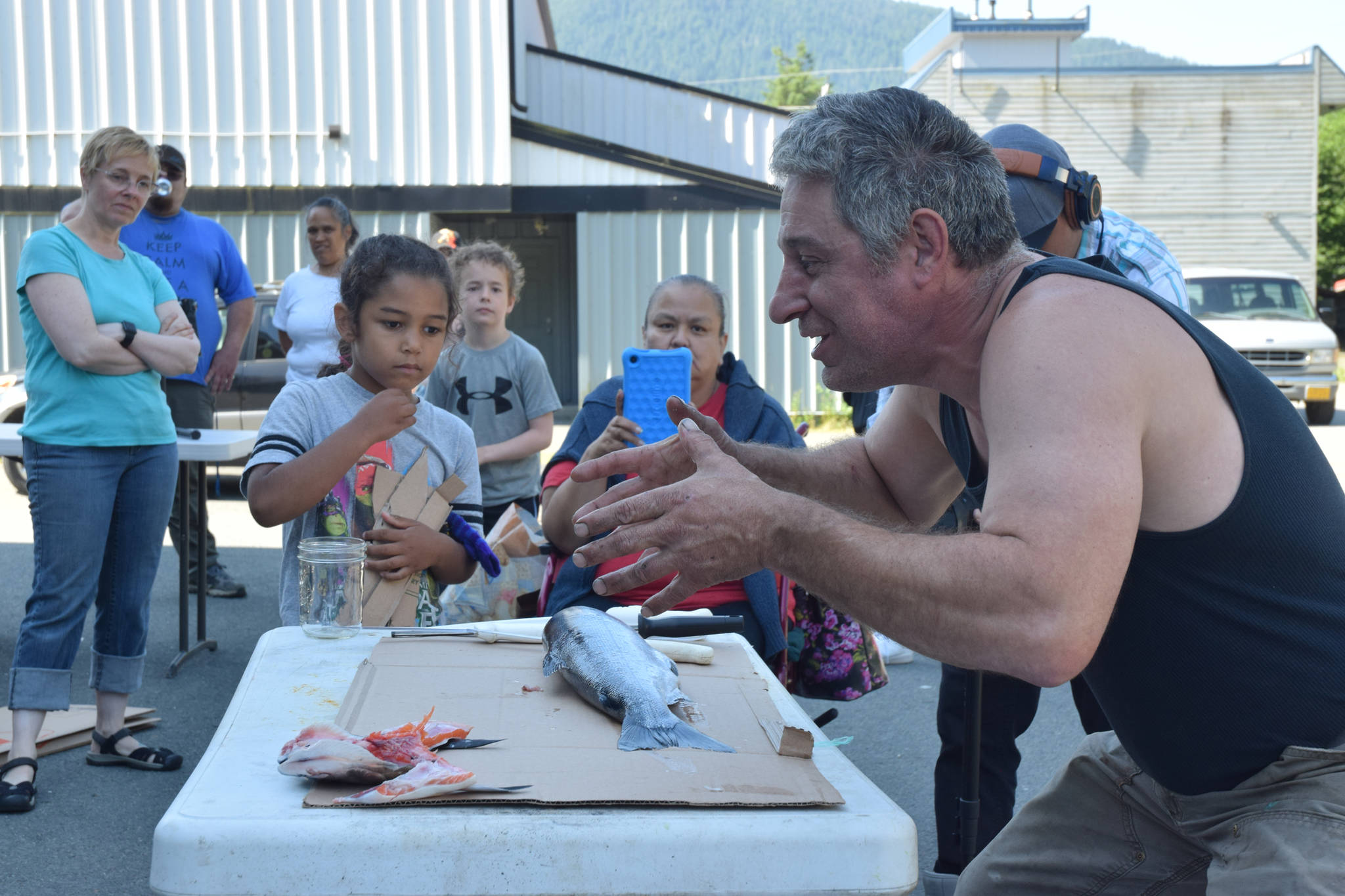Tommy Jimmi Jr. remembers dip-netting for hooligan as a child, his elders behind him on the beach, snow soaking through his clothes.
It wasn’t a pleasant experience. His grandfather woke him at 2:30 a.m. After three hours of fishing, he’d hauled in only 10 of the thin, 8-inch long fish.
“I thought, ‘Why can’t we go home now? Why did you get me up so early?’ Even at that age, I knew if we just waited a couple of days, there would be so much hooligan there, in three hours we’d have our smokehouses filled,” Jimmi Jr. said.
But the young man’s grandfather was trying to teach him something. He recounted the story to a group gathered Saturday for a salmon preservation workshop put on by the Goldbelt Heritage Foundation, a group of high school students listening respectfully.
“My grandfather steps up, he goes walking up to us and says, ‘What’s a matter with you? Don’t you know hooligan are happy people? The only way you’re going to catch it is if you’re happy too,” Jimmi Jr. said.
The elder grabbed Jimmi Jr.’s dip net to show him how it’s done, making a laughing noise before dipping his net into the water. He then pulled out a net full of hooligan.
Jimmi Jr. learned that day that fish respond to temperament. Everything is imbued with spirit. The young Native’s mindset was at play with the natural world around him, he learned.
“It’s really important the attitude we have when we’re going out and gathering the food that we’re using,” Jimmi Jr. said.
Stories like these are how Tlingit people share millennia-old cultural knowledge. That wisdom has allowed Native clans in Southeast to not only survive, but thrive, using only what they could harvest from the sea and forest.
Goldbelt Heritage Foundation is holding a series of workshops and gatherings this summer to pass on such wisdom. It’s called Family Culture Club. The group has covered several traditional resources, including spruce needles and skunk cabbage root, said organizer Victoria Johnson. They’re networking with other organizations around town to put the workshops on.
“It’s all about reclaiming our identity, our way of living,” Johnson said. “To be able to share it in the modern day that still reflects the old ways.”
Johnson said they’re hoping to develop cultural courses for high school and college age students, Johnson said. She’s hopeful all the effort will help the next generation of Native leaders to “develop their own stories, their own songs,” she said.
On Saturday, John Smith, a cultural specialist with the Juneau School District, and Sarah Lewis, with the University of Alaska’s Cooperative Extensions Service, led a workshop on preserving salmon near the Tlingit and Haida Vocational Training and Resource Center.
Salmon is, of course, a cornerstone of the Alaska diet. Smith has been harvesting, smoking and cutting fish since he was six years old. He’s developed the “hands,” he said, which allow him to carve up a salmon in seconds. Smith works at several JSD schools building gardens and teaching children Tlingit cultural practices. He also works construction.
Lewis brought a scientific perspective, explaining in western terms the techniques to preserve salmon that Tlingits discovered and passed down for preservation. Modern science has now come to understand more fully the value of Native techniques for harvesting, sustaining and preserving natural resources, Johnson said.
“Scientists are now saying, ‘Hey, this is what these guys were talking about a long time ago, and here today, oh, I discovered it. We’d like to pull that back and say, ‘It’s been here a long time, and we’re still sharing it in our way.’”
To Smith, opportunities like the Family Culture Club are an opportunity to steward a new generation. During a lull in the presentation, a group of boys competed in a corner of the parking lot at different Native Youth Olympic jumping games.
“I think it’s great what they’re doing,” Smith said.
• Contact reporter Kevin Gullufsen at 523-2228 and kgullufsen@juneauempire.com. Follow him on Twitter at @KevinGullufsen.

